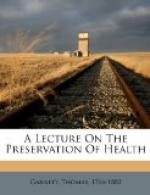When you take a ride into the country on a cold day, you find yourselves very cold; as soon as you go into a house, you are invited to come to the fire, and warm yourselves; and what is still worse, to drink something warm and comfortable, to keep out the cold, as the saying is. The inevitable consequence of this, is, to bring on the complaints which I have just described, which might with more propriety be called, heats than colds. But how easily might these complaints have been avoided! When you come out of a very cold atmosphere, you should not at first go into a room that has a fire in it, or if you cannot avoid that, you should keep for a considerable time at as great a distance from the fire as possible, that the accumulated excitability may be gradually exhausted, by the moderate and gentle action of heat; and then you may bear the heat of the fire without any danger: but, above all, refrain from taking warm or strong liquors while you are cold. If a person have his hands or feet exposed to a very severe cold, the excitability of those parts will be so much accumulated, that if they should be brought suddenly near the fire, a violent inflammation, and even a mortification will take place, which has often happened; or, at any rate, that inflammation called Chilblains will be produced, from the violent action of the heat upon the accumulated excitability of those parts; but, if a person so circumstanced, was to put his hands or feet into cold water, very little warmer than the atmosphere to which he had been exposed, or rub them with snow, which is not often colder than 32 or 30 degrees, the morbid excitability will be gradually exhausted, and no bad consequences will ensue.




